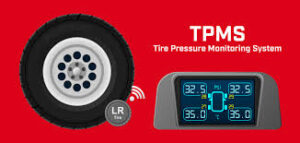Blog
The Impact of TPMS on Insurance Rates
The Impact of TPMS on Insurance Rates
A Tire Pressure Monitoring System (TPMS) is more than just a convenience; it’s a vital safety feature for modern vehicles. While its primary purpose is to monitor tire pressure and prevent accidents caused by underinflated tires, TPMS can also influence an often-overlooked aspect of vehicle ownership: insurance rates.
In this article, we explore how TPMS affects insurance premiums, why insurers value this technology, and how it can benefit car owners and fleet operators alike.
What is TPMS, and Why Does it Matter?
A TPMS continuously monitors the air pressure in your tires, alerting you to any significant deviations from the recommended levels. These systems come in two main types:
- Direct TPMS: Uses sensors inside the tires to measure actual pressure.
- Indirect TPMS: Relies on wheel speed data to estimate pressure differences.
Both systems contribute to vehicle safety by reducing the risks associated with improperly inflated tires, such as:
- Tire blowouts
- Reduced braking performance
- Poor handling
- Increased fuel consumption
Insurance providers recognize these benefits, which can influence their assessment of risk and, consequently, your premiums.

How Insurance Companies Assess Risk
Insurance premiums are calculated based on a variety of factors, including:
- The likelihood of accidents
- The cost of repairs and medical claims
- The presence of safety features in a vehicle
Safety features like TPMS lower the probability of tire-related accidents, making them a point of interest for insurers.
The Direct Impact of TPMS on Insurance Rates
1. Reduced Accident Risk
- Tire-Related Accidents: Statistics show that underinflated tires are a leading cause of blowouts and accidents. TPMS reduces this risk by alerting drivers to pressure issues before they escalate.
- Lower Risk Profile: A vehicle with TPMS is less likely to be involved in an accident caused by tire failure, which can lead to lower premiums.
2. Compliance with Regulations
- In many regions, TPMS is mandatory in newer vehicles, ensuring compliance with safety standards. Insurance companies may offer discounts for vehicles equipped with this technology as part of their “safe vehicle” incentive programs.
3. Enhanced Claims History
- A TPMS-equipped vehicle may result in fewer claims related to tire failure or accidents, positively affecting your claims history. Over time, this could translate into reduced premiums.
Indirect Benefits of TPMS for Insurance Rates
1. Improved Driver Behavior
- TPMS encourages proactive maintenance, such as checking and maintaining tire pressure regularly.
- Drivers who take care of their vehicles are often viewed as lower-risk policyholders.
2. Vehicle Longevity and Condition
- Properly inflated tires contribute to overall vehicle health, reducing wear and tear on other components.
- A well-maintained vehicle has a higher resale value and is considered less risky by insurers.

Fleet Operators: The Role of TPMS in Commercial Insurance
For fleet operators, TPMS is even more impactful. Commercial insurance rates are heavily influenced by factors like accident frequency and maintenance records.
Benefits for Fleets
- Accident Prevention: TPMS helps fleets avoid costly accidents caused by tire blowouts.
- Lower Maintenance Costs: Proper tire pressure reduces wear and tear, minimizing downtime and repair expenses.
- Telematics Integration: Advanced TPMS systems can integrate with telematics to provide real-time data, improving fleet safety and operational efficiency.
Many insurers offer premium discounts to fleets that adopt technologies like TPMS as part of their risk management strategy.
Can TPMS Guarantee Lower Insurance Rates?
While TPMS has a positive impact, it is not a standalone factor in determining premiums. Its influence is part of a broader picture that includes:
- The driver’s record
- The vehicle’s make and model
- Location and usage patterns
However, TPMS adds to the list of safety features that can tip the scales in your favor when negotiating premiums.
How to Maximize the Benefits of TPMS
1. Choose the Right TPMS
- Invest in a reliable TPMS that provides accurate readings and real-time alerts.
- Opt for systems that integrate with your vehicle’s dashboard or mobile devices for ease of use.
2. Maintain Your TPMS System
- Regularly check sensor functionality and replace batteries when needed.
- Calibrate the system according to the manufacturer’s recommendations.
3. Combine TPMS with Other Safety Features
- Vehicles equipped with multiple safety systems, such as ABS, lane departure warnings, and automatic emergency braking, are more likely to qualify for insurance discounts.
4. Inform Your Insurance Provider
- If your vehicle has TPMS, notify your insurance company and inquire about potential discounts.
Why RegalXMuse Recommends TPMS
At RegalXMuse, we prioritize your safety and the longevity of your vehicle. Our curated selection of TPMS devices ensures that you stay informed about your tire pressure at all times.
Our Promise
- Top-Quality Products: We offer TPMS devices from trusted brands that deliver accurate and reliable performance.
- Expert Guidance: Our team can help you select the best system for your needs, whether you’re an individual driver or a fleet operator.
- Affordable Options: Protecting your vehicle shouldn’t break the bank. We offer competitive pricing on all TPMS solutions.
Conclusion
While TPMS may not directly slash insurance rates in every scenario, it contributes to safer driving, reduced accident risk, and lower vehicle maintenance costs. These factors make you a less risky policyholder in the eyes of insurers, potentially leading to lower premiums over time.
At RegalXMuse, we’re here to help you make the most of this technology. Browse our collection of TPMS devices today and take the first step toward safer driving and better insurance outcomes.


